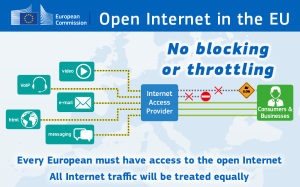Introduction to Open Internet
What is Net Neutrality or Open Internet and why does it matter?
Net Neutrality refers to a debate about the way that Internet Service Providers (ISPs) manage the data or traffic carried on their networks when data is requested by broadband subscribers (known as end-users under European Union (EU) law) from providers of content, applications or services (CAPs) such as YouTube or Spotify, as well as when traffic is exchanged between end-users. In the EU, Regulation (EU) 2015/2120 of the European Parliament and of the Council of 25 November 2015 laying down measures concerning open internet access – the ‘Open Internet Regulation’ – addresses these topics.

Under the EU rules, ISPs are prohibited from blocking or slowing down internet traffic, except where necessary. The exceptions are limited to traffic management to comply with a legal order; to ensure network integrity and security; and to manage exceptional or temporary network congestion, provided that equivalent categories of traffic are treated equally. The provisions enshrine in EU law an end-user’s right to access and distribute information and content, and to use and provide applications and services without discrimination’. Specific provisions ensure that national authorities can enforce this new right.
The ‘best effort internet’ relates to the equal treatment of data traffic being transmitted over the internet, i.e. that the ‘best efforts’ are made to carry data, no matter what it contains, which application transmits the data (application-agnosticism), where it comes from or where it goes. The benefits of the best effort internet notably include the separation between application and network layers of the internet. This separation enables innovation of applications independent of the ISP, thereby enhancing end-user choice.
Why is BEREC involved in implementing the Open Internet rules?
As the European body which brings together all National Regulatory Authorities (NRAs), BEREC is informed by the ‘on the ground’ knowledge, experience and technical expertise of its constituent NRAs. The European law establishing BEREC states that it should provide advice to both the European institutions and NRAs in the field of electronic communications. In order to contribute to the consistent application of the Open Internet Regulation, Article 5(3) explicitly obliges BEREC to issue guidelines for the implementation of the obligations of the NRAs under the Open Internet Regulation.
Using a regulation as the form of EU law on NN (rather than, for example, a directive) means that the precise wording of the law is identical in all EU or European Economic Area (EEA) countries. Nevertheless, by providing guidance on how the NRAs should implement the law, BEREC can draw upon its legal, technical and economical expertise to further contribute to a consistent application of the law across all EU/EEA countries.
Check out the work of the Open Internet Working Group
Read more about Open Internet:
Judgements on the Open Internet Regulation by the European Court of Justice
Judgment of 15 September 2020 regarding the cases C-807/18 and C-39/19
Judgment of 2 September 2021 regarding the case C-854/19
Judgment of 2 September 2021 regarding the case C-5/20
Judgment of 2 September 2021 regarding the case C-34/20
About the BEREC Open Internet Guidelines published in 2022
BEREC Open Internet Guidelines (2022)
Contributions from various types of stakeholders 2022
Responses from stakeholders to the call for input (2021)
BEREC Opinions for the evaluation of the application of the Open Internet Regulation
BEREC Opinion for the evaluation of the application of the Open Internet Regulation (2022)
About the BEREC Open Internet Guidelines published in 2020
BEREC Open Internet Guidelines (2020)
Report on the outcome of the public consultation on draft BEREC Open Internet Guidelines (2020)
Contributions from various types of stakeholders (2020)